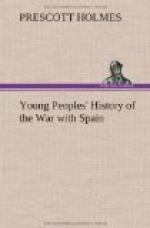Blockading work is very hard upon officers and men. It requires ceaseless vigilance at all hours of the day and night. Besides preventing an enemy’s ships from coming out of a blockaded port, it is very important to prevent vessels with supplies from running in. During the Cuban blockade our vessels captured at least one large ship loaded with coal that was intended for Admiral Cervera’s fleet. When nations are at war, they do not allow other nations to supply their enemies with anything that will help them. There are international laws about this, and if a warship belonging to a nation which is at war with another, puts into a neutral port for coal or provisions, it is only allowed to buy enough to last it to its nearest home port. It is not allowed to remain in a neutral port more than twenty-four hours, either.
The purpose of a blockade is to cut off supplies and stop all communication with the enemy by sea. When this is done, merchant vessels of all nations are therefore forbidden to pass or even to approach the line, and the penalty for disobedience is the confiscation of both ship and cargo, whether the latter is contraband or not. If a ship does not stop when hailed, she may be fired upon, and if she is sunk while endeavoring to escape, it is her own fault. Blockade running is perilous business, and is usually attempted under cover of night, or in stormy weather, and it is as full of excitement and adventure as war itself. The motive is usually either to take advantage of famine prices, or to aid the enemy by bringing supplies or carrying despatches. Neutral ships are entitled to some sort of warning that a blockade exists, and in the case of Cuba, the United States notified neutral Governments, announcing the fact, and stating exactly the extent of coast covered.
Before we were at war with Spain, the Government restrained and punished those who organized expeditions to help the Cubans. We were obliged to do this because we were a neutral nation. But after our war with Spain began, we sent all kinds of war material to the Cubans, so as to help them to fight Spain. I will tell you about one of these expeditions.
About the middle of May, the steamer Florida sailed from a port in the State for which she was named, with supplies for the Cuban army. In addition to a great quantity of provisions, clothing, shoes and medicines, she carried several thousand rifles and an immense amount of ammunition. Down in the hold were a hundred horses and mules, and among the passengers were several hundred recruits for the Cuban army.
The Florida reached the Cuban coast in safety, and was met at the appointed place by more than a thousand Cubans. It required three days and one night to unload the cargo. Small boats conveyed the stores to the eager hands that hurried them inland. The mules and horses swam ashore. Women and children flocked to the scene, bringing fruit and vegetables to exchange for coffee and meat—the first they had tasted for a long time.




